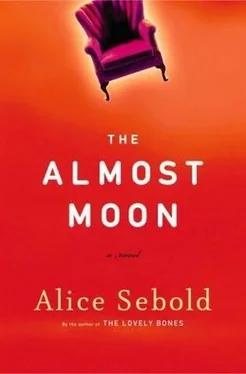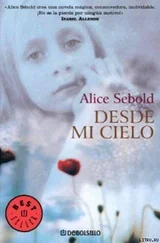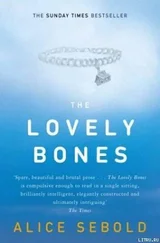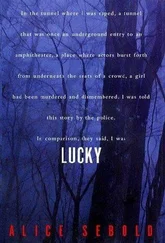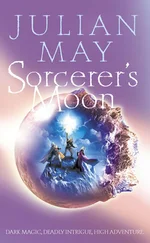“Death?” she queried, looking up at me.
“Nice to meet you, sister,” I said in a warbling baritone.
In the scattered moments after dropping Hamish off, I didn’t know whether to congratulate myself or break out the ice packs. It had been two decades plus since I’d had sex in a car with a man who hadn’t yet reached an age when he coughed or spit or groaned when he woke up. We had agreed, vaguely, to see each other again, and his eyes had focused on me with what I can only call a Vaseline-on-the-lens acuity. He saw sex and experience. Through my own clouded perceptions, I saw, when I looked his way, the last vestiges of grace.
It was deep night. Clouds covered the moon, and in my neighborhood, unlike Natalie’s, outdoor lighting had not become a competitive sport of motion sensors and solar-powered path spotlights. There was the occasional faux carriage lamp, and the Mulovitches at the end of the block kept a bare bulb on over their front door that was bright enough to interrogate their pothead son by, but my lawn and the lawns surrounding it were pitch-black.
My father and Mr. Forrest had found a home for me in the very neighborhood where my father had once looked when I was a teenager. On move-in day, he had driven the three of us over in his car and snapped photos as the Realtor handed me the key. When I walked inside, I was able to ignore the walls that needed to be painted and the floors that needed to be cleaned because my father had come the day before and had had delivered two beds for the girls and a mattress and dresser for me.
Barefoot, I left my car and walked onto the lawn. The grass was cool but dry against my feet, the heavy dew still hours away. All in all, it was early. Somewhere, Westmore students vomited in the shrubs at the edges of half-acre lots in which kegs sat on back porches. Teenage girls passed out in places they shouldn’t, and Sarah would be, if I knew her, just starting her night out in the East Village. It took me a moment to remember her current boyfriend’s name, but as I reached up to touch the branch of the dogwood tree, I remembered its fill-in-the-blank quality. Joe or Bob or Tim. A one-syllable, easily replaceable name. Like Jake.
I walked to the center of my front lawn and lay down, spread-eagled. I looked up at the stars. How did I end up in a place where doing such a thing marked you for crazy, while my neighbors dressed concrete ducks in bonnets at Easter and in striped stocking caps at Christmas but were considered sane?
I let my shoes and purse fall from my hands. Only a few stars were out. The earth was cold beneath me. “There are children starving in China,” my mother had frequently said to me when I gorged on food.
“That doesn’t mean I’m not hungry,” I whispered now. I thought of her face when I had brought Jake from Wisconsin to meet them. He had been the first, and last, direct challenge to her power. She had welcomed him with a floor show so extreme that it was almost painful to watch. She forced herself to smile and bow and scrape as if he were the lord of the manor and she merely a lowly thing. Why hadn’t I seen the truth? She had a steely resolve that surpassed anything Jake and I might build. Our swizzle-stick empire was so fragile in the end. “The only thing you’ve ever loved is your mother!” he had yelled at me. I had refused this truth, brought my hands up as if to stop a blow.
I knew where my mother was. She was not in the heavenly skies but in her basement, stone-cold dead. I had her braid in my purse to prove it. I forced myself to stare at the sky-unblinking. If she was there, I couldn’t make her out. She could be a dark star behind a cloudy mass, like the tiny tumor that finally comes to kill, but I did not see her, no matter how hard I looked.
I turned onto my side. The final leavings of Hamish drained out of me. I felt spent and oddly whole and ready to sleep. I thought of the platform I was scheduled to mount later that day and the pose I was meant to strike. I was in the fourth week of sitting for Tanner Haku’s Life Drawing class. I had, until the day before, been working out in front of the mirror with small weights and doing yoga even more diligently in order to keep my muscles teeming just below my skin. I knew that was what Haku wanted, and I knew adapting to the teacher’s wishes was the linchpin of life modeling. Not just striking the pose but understanding what amount of physicality he or she wanted you most to bring. Natalie was having her usual cream-cheese-and-bagels semester, as the instructor she was perpetually assigned to was a faux Lucian Freud. He wanted rolls of fat and body hair and a good patch of scarred or rash-strewn skin.
“Slump!” he would command.
Modeling had been something I’d talked her into. She had been reluctant at first, self-conscious of her body, but it had led to a part-time job in the bursar’s office, and now she balanced the two.
I pushed myself up off the ground and stood, gathering my shoes and purse and finding my keys with the trusty flashlight attached. This, like the cell phone, had been another mother-inspired gift. I had often approached the mall like a sergeant arming a battalion. Mother and I would have cell phones. Mother and I would have flashlight key chains. Mother and I would have new stainless-steel teakettles, down-filled pillows, Scotchgarded all-canvas slipcovers. If. Then. If we shared X, then all would be ready and steady and right. When I inserted the key in the lock of my door, I saw my own epitaph: SHE LIVED SOMEBODY ELSE’S LIFE.
Years ago, when I began to feel overwhelmed by having to care for my mother, I started to dispose of small items throughout my house. Perhaps that’s why I wouldn’t have blamed Mrs. Castle if she had stolen the Pigeon Forge bowl. In some sense, after all she’d done, I’d more than once felt like opening my mother’s jewelry box and saying, “Help yourself.” Unfortunately, young Manny of the condom had already done that, a fact I had successfully kept hidden from everyone.
I took my coat off and let it drop to the flagstone floor instead of hanging it up. In contrast to my mother’s house, I always kept at least one window open, even as it grew cooler. I liked the feeling of air constantly coming in to refresh the rooms. I walked to the shelf in the living room, and between the Virginia Woolf and the Vivian Gornick (I file my authors on a first-name basis), I spied tonight’s item: a weeping Buddha made of wood. A gift from Emily.
As if I am committing a crime, I will take an item-a paperweight, a dried-flower arrangement, a small cameo brooch of my great-great-grandmother’s-and “accidentally” dispose of it on trash day. I’ve done this on a whim, never planned. I’ll see something resting on a shelf and feel the need to grab a piece of newspaper or an old rag and cloak it, like a magic trick. Then I’ll walk rapidly to the curb and dump it into the sole pristine can of labeled waste waiting to be forked up by the garbage truck. A lightness overtakes me. One less stone weighing me down.
I looked at the weeping Buddha, the size of a fist and carved of gnarled wood. It would be the first item of my own that I disposed of-a gift from my child. But as I reached out to grab it, I thought of Manny.
I touched the Buddha with my fingers but let it remain on its stand.
I walked upstairs to my bedroom, trying not to think of Manny having sex in one of the rooms of my mother’s house while, most likely, she was downstairs, sitting in her chair in the living room. What did I owe him besides the tips I had given him above and beyond what my mother had paid him?
I turned on the bedside lamp. What had I been reading before this day began? Emily had sent me a new translation of the Tao Te Ching. The slim volume itself was comforting to hold, but when I opened the pages and tried to read, it was as if all language had turned to X s. I was not a fish or a door or a reed and never would be. I was a fetid human creature à la Lucian Freud.
Читать дальше
